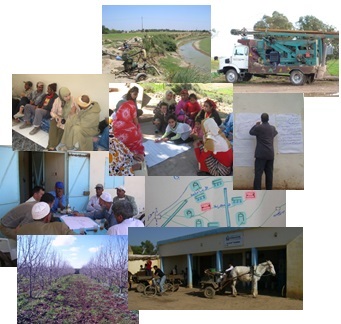Driss Benlarbi, Nicolas Faysse, Zhour Bouzidi
https://doi.org/10.60569/hsoua-a6
Hors-série ouvrières agricoles, août 2025
Résumé
Au Maroc, le salariat agricole, masculin et féminin, s’est beaucoup développé. Cependant, les travailleurs restent souvent dans une situation de forte précarité. L’article analyse les dispositifs d’action publique visant à améliorer les conditions de travail et la protection sociale des ouvrières et ouvriers agricoles. Des entretiens ont été effectués dans la zone du Saiss auprès d’ouvrières agricoles, de syndicalistes agricoles, d’un inspecteur du travail et de deux représentants du ministère de l’intérieur. Il existe de nombreux dispositifs d’action publique relatifs au droit du travail, à la protection sociale, aux activités syndicales et au contrôle de l’inspection du travail dans le secteur agricole. Toutefois, leur mise en œuvre reste très limitée, principalement parce que la majorité des ouvriers agricoles exercent dans le secteur informel. En conséquence, ces mesures ont peu d’impact sur l’amélioration des conditions de vie des travailleurs. Pour qu’elles puissent réellement produire des effets positifs, il est indispensable d’élaborer une stratégie globale et cohérente visant à transformer en profondeur le fonctionnement du marché du travail agricole. Une telle stratégie devra notamment se donner les moyens : 1) d’inciter les différentes parties prenantes à formaliser des contrats du travail ; 2 renforcer les obligations des exploitations agricoles en matière de respect du droit du travail ; 3) se donner des moyens suffisants pour que le contrôle de l’application des dispositifs prévus soit effectif.
Mots clés : Travail agricole, informalité, protection sociale, syndicalisme, zone du Saiss
تدابير الفعل العمومي لتحسين ظروف العمل والحماية الاجتماعية للعاملات والعمّال الزراعيين في منطقة سايس بالمغرب
الملخص
عرف العمل المأجور في القطاع الزراعي في المغرب ، سواء بالنسبة للرجال أو النساء، تطورا ملحوظا، ومع ذلك، يظل العمال في وضعية هشاشة كبيرة . يحلل هذا المقال تدابير الفعل العمومية الرامية إلى تحسين ظروف العمل والحماية الاجتماعية للعاملات والعمال الزراعيين، استنادا إلى مقابلات أُجريت في منطقة سايس مع عاملات زراعيات ونقابيين زراعيين ومفتش شغل إضافة إلى ممثلَين عن وزارة الداخلية . ورغم وجود العديد من هذه التدابير المتعلقة بقانون الشغل، والحماية الاجتماعية، والنشاط النقابي، ومراقبة مفتشية الشغل في القطاع الزراعي، فإن تنفيذها يظل محدودا جدا، ويعود ذلك بالأساس إلى أن أغلب العمال الزراعيين يشتغلون في القطاع غير المهيكل، مما يجعل أثر هذه التدابير ضعيفا في تحسين ظروف عيشهم . ومن أجل أن تحقق هذه التدابير أثار إيجابية فعلية ، تبرز الحاجة إلى وضع استراتيجية شاملة ومنسجمة لإحداث تحوّل عميق في طريقة اشتغال سوق الشغل الزراعي، تقوم أساسا على : 1) تحفيز مختلف الأطراف المعنية على إبرام عقود عمل قانونية ؛ 2) تعزيز التزامات الضيعات الزراعية باحترام قانون الشغل ؛ 3) توفير الوسائل الكافية لضمان مراقبة فعالة لتطبيق التدابير المنصوص عليها .
الكلمات المفتاحية: العمل الزراعي، القطاع غير المهيكل، الحماية الاجتماعية، العمل النقابي، منطقة سايس
Public policy measures to improve the working conditions and social protection of agricultural women and men workers in the Saiss region of Morocco
Abstract
In Morocco, waged employment in the agricultural sector, for both men and women, has grown significantly. However, workers remain in a situation of considerable vulnerability. This article analyzes public policy measures aimed at improving the working conditions and social protection of agricultural laborers, based on interviews conducted in the Saiss region with female agricultural workers, agricultural trade unionists, a labor inspector, and two representatives of the Ministry of the Interior. There are numerous public measures relating to labor law, social protection, trade union activities, and labor inspection in the agricultural sector. However their implementation remains very limited, mainly because the majority of agricultural workers are employed in the informal sector. This greatly reduces the impact of these policy measure on improving workers’ living conditions. To produce tangible positive effects, it is essential to develop a comprehensive and coherent strategy to deeply transform the functioning of the agricultural labor market, focusing particularly on encouraging stakeholders to formalize employment contracts, strengthening the obligations of farms in terms of compliance with labor law, and providing sufficient resources to ensure the effective enforcement of the measures in place.
Keywords: Agricultural work, informality, social protection, trade unionism, Saiss region

